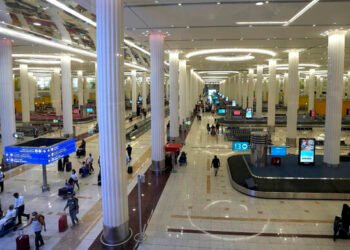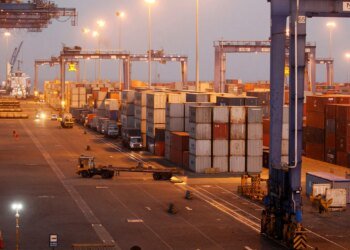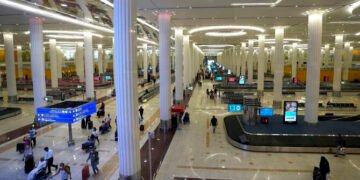The International Air Transport Association (IATA) has called on governments to begin repatriating blocked airline funds following a 47 per cent increase. The combined total owed currently sits at almost $2.3 billion, divided across 27 countries.
Airline blocked funds have risen by 4️⃣ 7️⃣ % in the last 12 months to reach $2.27 billion. #Airlines can't sustain services where they can't repatriate revenues. Govts need to remove barriers to ✈️ ✈️ repatriating their revenues.
➡️ https://t.co/52yuzV2hsd#IATAAGM pic.twitter.com/9dHTOd6IFY
— IATA (@IATA) June 4, 2023
Nigeria remains the top country where airlines’ revenues are stuck, with $812.2 million. Bangladesh followed with $214.1 million, Algeria with $196.3 million, Pakistan with $188.2 million and Lebanon with $141.2 million. IATA said that the figure has increased by almost $1552 million of the blocked amount attributed to just these five countries.
Leaders of the global ✈️ industry are gathering in Istanbul, 🇹🇷 for the 79th #IATAAGM.
The event, happening on 4-6 June, attracts the industry’s most senior leaders from among IATA’s 300 ➕ ✈️, govt officials, partners & media.https://t.co/CRuGVSumnF@flymepegasus @anadolujet pic.twitter.com/vsAHwkN0yU
— IATA (@IATA) June 2, 2023
IATA cautioned the nations with outstanding debts to airlines, citing compliance with respective international agreements and obligations.
This is depriving the aviation industry of much-needed cash, risking reduced air connectivity and damaging investors’ perceptions of these economies, IATA added.
The amount of airline revenue prevented by governments from repatriation has jumped by 47 per cent in the last 12 months, the industry body said at a press briefing in Istanbul.
Unveiling 5️⃣ roadmaps at #IATAAGM detailing where all #aviation stakeholders should focus their efforts on the journey to #FlyNetZero by 2050 ✈️ 🌿
Find out more ➡️ https://t.co/8Zs6y2JNSk pic.twitter.com/jUC0pA9Bt6
— IATA (@IATA) June 4, 2023
Nigeria has been responsive to IATA’s prompts to address the problem until about six months ago, with the election of a new government, he said.
“They still have to look at what they’re doing to their own economy and to the aviation industry,” Al-Awadhi said. “This is beginning to bite.”
Algeria has been “slow” in releasing the airlines funds, while Lebanon is facing a “complete collapse in the financial industry”. But it is still working with IATA to resolve the issue, Kamil Al Awadhi, regional vice president of Africa and the Middle East, told reporters at the 79th annual meeting of IATA.
Blocked remittances have plagued airlines for years but the Covid-19 pandemic has exacerbated the situation, leaving airlines strapped for cash after about three years of weak travel demand.
“Airlines can’t keep funding this … the aviation industry just came out of the worst disaster ever seen in the 100 years it existed. It means they’ve come out with very little cash, every penny counts now and they can’t wait,” Al Awadhi said.
Peter Cerdá, IATA´s RVP Americas, outlined the potential for growth ↗️ across the region and called on governments and industry partners for their collaboration in support of the 🌎 socio-economic recovery.
Details ➡️ https://t.co/Tu1sqMtDqn#IATAAGM pic.twitter.com/32goNm4RQ1
— IATA (@IATA) June 4, 2023
Nigeria’s continued blocking of funds is putting airlines in a “tighter position”, with some carriers forced to temporarily suspending or reducing services, because they cannot continue to fund these operations, he said.
Nigeria’s decisions to continue blocking funds reduces air connectivity, creates negative perceptions about the business environment, raises ticket prices, discourages investors and hurts the country’s travel agents’ business, he added.
The IATA official said he hopes the new government in Nigeria will take “positive measures to remedy” the problem as soon as possible.
In March, Emirates airline said it was owed a “substantial” amount in ticket sales revenue by Nigerian authorities, with little progress made so far in repatriating the blocked payments from Africa’s most populous nation.
Nigeria’s airline issues began in March 2020, when demand for foreign currency in the country outpaced supply and its banks were not able to service currency repatriations.
The 79th #IATAAGM and World Air Transport Summit is taking place on 4-6 June in Istanbul, 🇹🇷.
We look forward to connecting with industry peers and enjoying local hospitality.
More 👉 https://t.co/vH2TNXAtRw
Thanks to our host ✈️ ✈️ ⬇️ ⬇️ @flypegasus @anadolujet pic.twitter.com/XR6jFSMe5w
— IATA (@IATA) June 4, 2023
Nigeria is the highest debtor named by the IATA, with coverage of the crisis seeing significant coverage through summer and autumn. The debt notably became the subject of an ongoing feud between the government and Dubai-based Emirates. Last month, the airline withdrew from operations in the West African nation after continued delays in repatriating its revenue.
IATA chief Walsh urges planemakers to fix aircraft delivery delays
The head of a group representing global airlines renewed pressure on planemakers to speed up plane and parts production, warning the delays would curtail airline capacity as demand for air travel nears a full recovery from the pandemic.
Willie Walsh, director general of the IATA, said the topic had been raised by “every single one” of the airline CEOs he had met as the industry gathers for a three-day annual meeting in Istanbul.
Airlines “are not concerned about the macroeconomic environment, they’re concerned about the access to spare parts for their existing aircraft and the delivery of new aircraft. So it’s definitely got to hold back capacity growth,” he said.
#IATA has urged planemakers to boost plane and parts production, warning that further delays could shrink airline capacity as demand for air travel approaches pre-pandemic levels.#Forbeshttps://t.co/T2QgHHDyfn
— Forbes Middle East (@Forbes_MENA_) June 4, 2023
“It’s frustrating because airlines can see strong demand, but they’re not able to match supply with demand in many markets. And this is something we want to see resolved.”
Airbus and Boeing have blamed supply chains for delivery delays, while bottlenecks in a network of engine repair shops have also forced airlines to ground dozens of jets.
The gathering comes two weeks before the Paris Airshow, where supply pressures are likely to overshadow new orders.








 United Arab Emirates Dirham Exchange Rate
United Arab Emirates Dirham Exchange Rate
